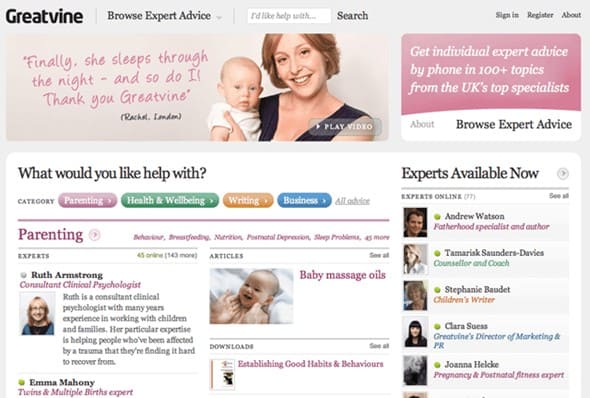Do you remember before Xmas I wrote this post about a less than positive report I received from Little Bean’s preschool when I collected her and the following day I wrote this post because the situation got worse, not better? Well in my ‘hour’ of need, my blogging provided the relief that I needed. As a result of those posts I received a lovely email from a lady called Lara at Greatvine asking if I would like to have a chat with one of their Child Behaviour Experts about what had been happening with Little Bean.
I certainly didn’t have the answers myself so I was hoping that Greatvine could provide me with some insight because at that moment in time I felt like I had failed as a parent. I had attended parenting classes through my local SureStart Children’s Centre but the recent incidents knocked the confidence right out of me and I didn’t know what to do.
Greatvine are dedicated to providing advice and support, quickly and easily whether your issues relate to parenting and health or business and writing. They have teams of experts to help you who are just a phone call away.
The parenting experts have a wealth of experience in helping parents with particular challenges when dealing with difficult behaviour, they have experienced and respected Child Psychologists and Behaviour Coaches whose gentle and supportive methods can really make a difference to your family, they certainly did with mine.
I spoke with Jeni Hooper who is a Child Psychologist and Parent Coach. She reassured me that whilst this behaviour wasn’t acceptable, it was perfectly normal behaviour for a child of Little Bean’s age. In talking through things with Jeni we formulated a plan so that I could speak to her preschool about what to do if this behaviour surfaced again. Jeni made me realise too that Little Bean was probably feeling quite frightened and confused by her own behaviour since this was out of character and that perhaps I should be giving her a little more positive attention. This made me reflect on the previous week with Little Bean who had been particularly keen to spend more time alone with me, she only wanted me to put her to bed at night and after school she just wanted to cuddle up on the sofa with me. As it so happened, I had already accepted an invitation to a blog event in London on her last day of pre-school that week so I collected her from school and we had a special girl’s only train ride down to London and a perfect chance to have a talk and lots of cuddles. It turned out that a new girl had started at preschool and although she wasn’t in her keygroup, Little Bean’s keyworker (who is an especially loving lady) had been very attentive to the new girl because she was very upset in a morning when her Mummy left for the day. Little Bean had got on well with the new girl and had been giving her hugs and telling her that it was all ok but at the same time she was a little jealous of the attention she was getting from her keyworker. I’m pleased to report that after that day, we didn’t have any repeat performances from Little Bean and she has returned to being a popular little girl with the children and her ladies. In talking with Jeni from Greatvine I was given the opportunity to look at things from a different angle and she made me open up to new ideas on how to be with Little Bean and for that I am very grateful. Sometimes we already know the answers lie within ourselves but we need someone else to help us find it.
Greatvine’s Parenting Experts include:
Elaine Halligan – A parenting facilitator with The Parent Practice.
Dr Angharad Rudkin – Chartered Clinical Psychologist.
Jeni Hooper – Child Psychologist and parent coach.
Linda Blair – Chartered Clinical Psychologist and researcher, author of The Happy Child and Straight Talking.
Dr Sharon Lewis – Chartered Clinical Psychologist.
Dr Philippa Rundle – Paediatrician specialising in Child Behaviour and development.
Greatvine’s Top Tips for Better Behaviour
1. Be consistent – your child depends on you to provide clear boundaries and predictability, day in day out. Angharad Rudkin
2. Mean what you say – and say what you mean – otherwise how can you expect your child to believe what you’re saying? Angharad Rudkin
3. Understand that children aren’t little adults – they think and see things differently to us. Angharad Rudkin
4. Model the kinds of behaviour you want to see in your children. This is a lot more effective than telling them what they should be doing. Angharad Rudkin
5. Pick your battles and enjoy your children. Children have a great sense of fun, so join in with this and don’t worry about the small things. Angharad Rudkin
6. Praise their efforts and attitude, looking for the qualities they show rather than purely focusing on the end result and achievement. For example, “you waited until I finished talking before you said what you wanted to say. That was patient. It takes a lot of self-control to wait your turn”. Elaine Halligan
7. Establish rules by working out your values in all areas of family life and stick to them – involve your child in setting the rules. Elaine Halligan
8. Make sure there are meaningful rewards for good behaviour. The best rewards needn’t cost anything. Elaine Halligan
9. Encourage self-reliance skills from an early age. The more your child can do things for themselves and be in charge of their own emotions, the less they’ll blame others for how they’re feeling. Elaine Halligan
10. Really listen to your child by encouraging them to talk about their feelings and emotions. The key is to listen without judgement. Elaine Halligan.
11. Walk a while in your child’s shoes: get to know their strengths, temperament and moods. This will give you ways to influence them and reduce conflict and confrontation. When they’re very little you can distract them with a favourite activity, and as they grow up you can use your knowledge to offer more ‘carrots’ than ‘sticks’. Jeni Hooper
12. Be a parent first and a friend second. Parents have to be leaders and willing to be unpopular in the short term over important issues. Set boundaries with four or five positively phrased rules such as ‘Be Kind’ rather than ‘Don’t hit’. Jeni Hooper
13. Aim to praise your child five times more often than you give directions. Offer specific praise that shows you’ve noticed and valued what your child’s done. Honest but positive feedback won’t create unrealistic self-belief, but telling your child they are brilliant at everything might. Jeni Hooper
14. Aim to give your child a magical childhood where life is exciting and interesting. Discover the small things that excite your child and rouse their curiosity. Save the big things for an occasional treat to keep them special. Jeni Hooper
Do you have issues you would like to discuss with Greatvine? You can visit them online at www.greatvine.com or email them at info@greatvine.com



Great tips, thanks for sharing.